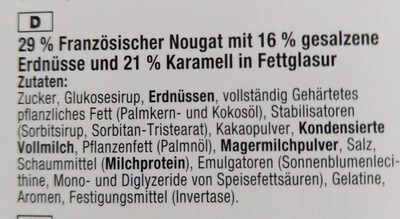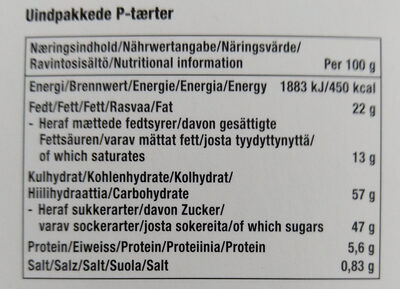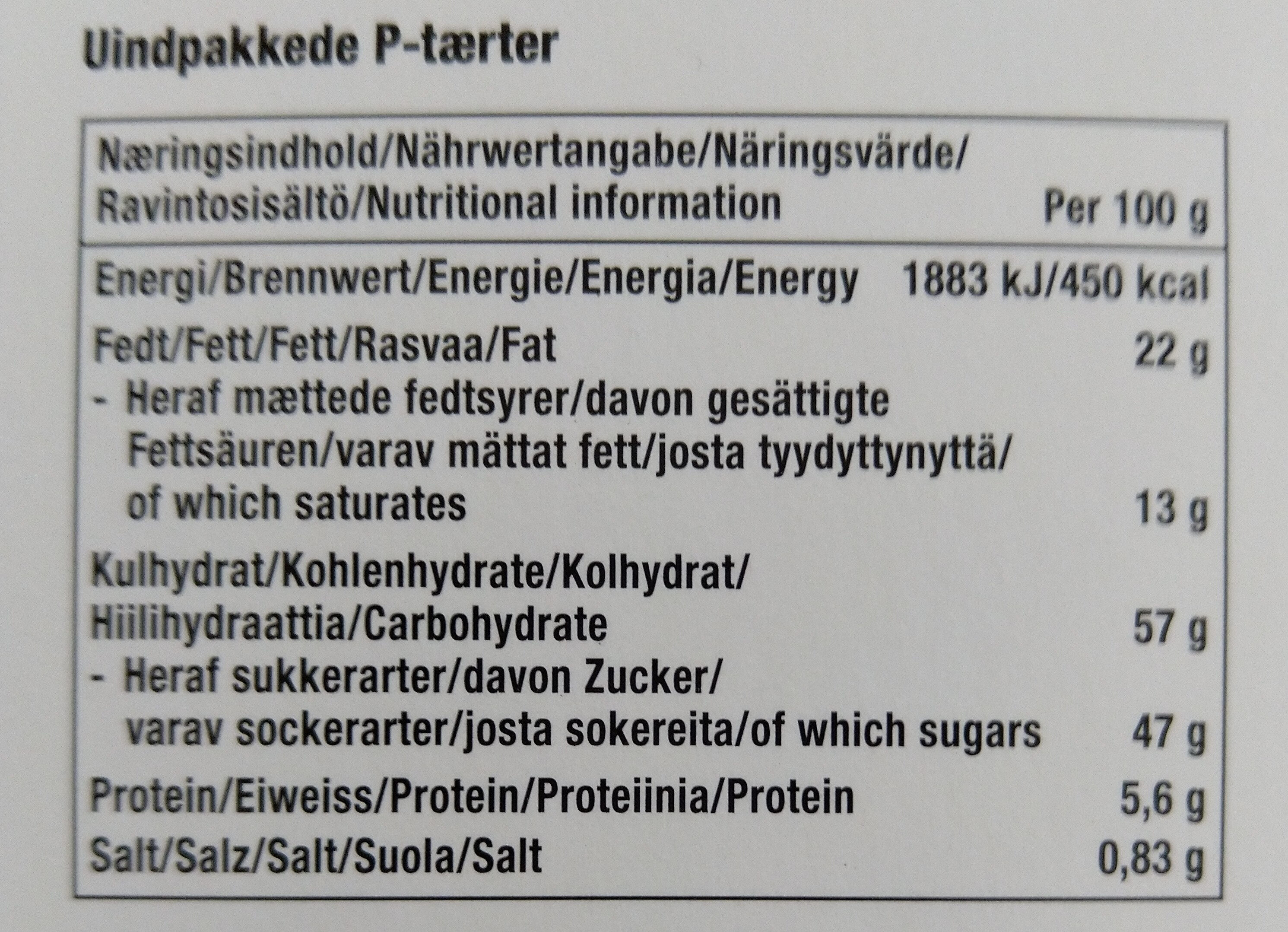Help us make food transparency the norm!
As a non-profit organization, we depend on your donations to continue informing consumers around the world about what they eat.
The food revolution starts with you!
P taerter Karamel - Carletti - 500 g
P taerter Karamel - Carletti - 500 g
This product page is not complete. You can help to complete it by editing it and adding more data from the photos we have, or by taking more photos using the app for Android or iPhone/iPad. Thank you!
×
Barcode: 5701049191227 (EAN / EAN-13)
Quantity: 500 g
Packaging: Cardboard, Paperboard
Brands: Carletti
Categories: Snacks, Sweet snacks, Confectioneries, Biscuits and cakes, Biscuits
Labels, certifications, awards:
FSC, FSC Mix
Countries where sold: Germany
Matching with your preferences
Health
Ingredients
-
24 ingredients
German: Zucker, Glukosesirup, Erdnüssen, vollständig Gehärtetes pflanzliches Fett (Palmkern - und Kokosöl), Stabilisatoren (Sorbitsirup, Sorbitan-Tristearat), Kakaopulver, Kondensierte Vollmilch, Pflanzenfett (Palmöl), Magermilchpulver, Salz, Schaummittel (Milchprotein), Emulgatoren (Sonnenblumenlecithine, Mono - und Diglyzeride von Speisefettsäuren), Gelatine, Aromen, Festigungsmittel (Invertase).Allergens: Milk, Peanuts
Food processing
-
Ultra processed foods
Elements that indicate the product is in the 4 - Ultra processed food and drink products group:
- Additive: E420 - Sorbitol
- Additive: E428 - Gelatine
- Ingredient: Emulsifier
- Ingredient: Firming agent
- Ingredient: Flavouring
- Ingredient: Glucose
- Ingredient: Glucose syrup
- Ingredient: Milk proteins
Food products are classified into 4 groups according to their degree of processing:
- Unprocessed or minimally processed foods
- Processed culinary ingredients
- Processed foods
- Ultra processed foods
The determination of the group is based on the category of the product and on the ingredients it contains.
Additives
-
E1103 - Invertase
Invertase: Invertase is an enzyme that catalyzes the hydrolysis -breakdown- of sucrose -table sugar- into fructose and glucose. Alternative names for invertase include EC 3.2.1.26, saccharase, glucosucrase, beta-h-fructosidase, beta-fructosidase, invertin, sucrase, maxinvert L 1000, fructosylinvertase, alkaline invertase, acid invertase, and the systematic name: beta-fructofuranosidase. The resulting mixture of fructose and glucose is called inverted sugar syrup. Related to invertases are sucrases. Invertases and sucrases hydrolyze sucrose to give the same mixture of glucose and fructose. Invertases cleave the O-C-fructose- bond, whereas the sucrases cleave the O-C-glucose- bond.For industrial use, invertase is usually derived from yeast. It is also synthesized by bees, which use it to make honey from nectar. Optimal temperature at which the rate of reaction is at its greatest is 60 °C and an optimum pH of 4.5. Typically, sugar is inverted with sulfuric acid.Source: Wikipedia
-
E420 - Sorbitol
Sorbitol: Sorbitol --, less commonly known as glucitol --, is a sugar alcohol with a sweet taste which the human body metabolizes slowly. It can be obtained by reduction of glucose, which changes the aldehyde group to a hydroxyl group. Most sorbitol is made from corn syrup, but it is also found in nature, for example in apples, pears, peaches, and prunes. It is converted to fructose by sorbitol-6-phosphate 2-dehydrogenase. Sorbitol is an isomer of mannitol, another sugar alcohol; the two differ only in the orientation of the hydroxyl group on carbon 2. While similar, the two sugar alcohols have very different sources in nature, melting points, and uses.Source: Wikipedia
-
E420ii - Sorbitol syrup
Sorbitol: Sorbitol --, less commonly known as glucitol --, is a sugar alcohol with a sweet taste which the human body metabolizes slowly. It can be obtained by reduction of glucose, which changes the aldehyde group to a hydroxyl group. Most sorbitol is made from corn syrup, but it is also found in nature, for example in apples, pears, peaches, and prunes. It is converted to fructose by sorbitol-6-phosphate 2-dehydrogenase. Sorbitol is an isomer of mannitol, another sugar alcohol; the two differ only in the orientation of the hydroxyl group on carbon 2. While similar, the two sugar alcohols have very different sources in nature, melting points, and uses.Source: Wikipedia
Ingredients analysis
-
Palm oil
Ingredients that contain palm oil: Palm kernel oil, Palm oil
-
Non-vegan
Non-vegan ingredients: Condensed whole milk, Skimmed milk powder, Milk proteins, E428Some ingredients could not be recognized.
We need your help!
You can help us recognize more ingredients and better analyze the list of ingredients for this product and others:
- Edit this product page to correct spelling mistakes in the ingredients list, and/or to remove ingredients in other languages and sentences that are not related to the ingredients.
- Add new entries, synonyms or translations to our multilingual lists of ingredients, ingredient processing methods, and labels.
If you would like to help, join the #ingredients channel on our Slack discussion space and/or learn about ingredients analysis on our wiki. Thank you!
-
Non-vegetarian
Non-vegetarian ingredients: E428Some ingredients could not be recognized.
We need your help!
You can help us recognize more ingredients and better analyze the list of ingredients for this product and others:
- Edit this product page to correct spelling mistakes in the ingredients list, and/or to remove ingredients in other languages and sentences that are not related to the ingredients.
- Add new entries, synonyms or translations to our multilingual lists of ingredients, ingredient processing methods, and labels.
If you would like to help, join the #ingredients channel on our Slack discussion space and/or learn about ingredients analysis on our wiki. Thank you!
-
Details of the analysis of the ingredients
We need your help!
Some ingredients could not be recognized.
We need your help!
You can help us recognize more ingredients and better analyze the list of ingredients for this product and others:
- Edit this product page to correct spelling mistakes in the ingredients list, and/or to remove ingredients in other languages and sentences that are not related to the ingredients.
- Add new entries, synonyms or translations to our multilingual lists of ingredients, ingredient processing methods, and labels.
If you would like to help, join the #ingredients channel on our Slack discussion space and/or learn about ingredients analysis on our wiki. Thank you!
de: Zucker, Glukosesirup, Erdnüssen, vollständig Gehärtetes pflanzliches Fett (Palmkern, und Kokosöl), Stabilisatoren (Sorbitsirup, Sorbitan-Tristearat), Kakaopulver, Kondensierte Vollmilch, Pflanzenfett (Palmöl), Magermilchpulver, Salz, Schaummittel (Milchprotein), Emulgatoren (Sonnenblumenlecithine, mono- und Diglyzeride von Speisefettsäuren), Gelatine, Aromen, Festigungsmittel (Invertase)- Zucker -> en:sugar - vegan: yes - vegetarian: yes - ciqual_proxy_food_code: 31016 - percent_min: 6.66666666666667 - percent_max: 100
- Glukosesirup -> en:glucose-syrup - vegan: yes - vegetarian: yes - ciqual_proxy_food_code: 31016 - percent_min: 0 - percent_max: 50
- Erdnüssen -> en:peanut - vegan: yes - vegetarian: yes - ciqual_food_code: 15001 - percent_min: 0 - percent_max: 33.3333333333333
- vollständig Gehärtetes pflanzliches Fett -> de:vollständig-gehärtetes-pflanzliches-fett - percent_min: 0 - percent_max: 25
- Palmkern -> en:palm-kernel-oil - vegan: yes - vegetarian: yes - from_palm_oil: yes - percent_min: 0 - percent_max: 25
- und Kokosöl -> en:coconut-oil - vegan: yes - vegetarian: yes - from_palm_oil: no - ciqual_food_code: 16040 - percent_min: 0 - percent_max: 12.5
- Stabilisatoren -> en:stabiliser - percent_min: 0 - percent_max: 20
- Sorbitsirup -> en:e420ii - vegan: yes - vegetarian: yes - percent_min: 0 - percent_max: 20
- Sorbitan-Tristearat -> de:sorbitan-tristearat - percent_min: 0 - percent_max: 10
- Kakaopulver -> en:cocoa-powder - vegan: yes - vegetarian: yes - ciqual_food_code: 18100 - percent_min: 0 - percent_max: 16.6666666666667
- Kondensierte Vollmilch -> en:condensed-whole-milk - vegan: no - vegetarian: yes - ciqual_food_code: 19026 - percent_min: 0 - percent_max: 14.2857142857143
- Pflanzenfett -> en:vegetable-fat - vegan: yes - vegetarian: yes - from_palm_oil: maybe - percent_min: 0 - percent_max: 12.5
- Palmöl -> en:palm-oil - vegan: yes - vegetarian: yes - from_palm_oil: yes - ciqual_food_code: 16129 - percent_min: 0 - percent_max: 12.5
- Magermilchpulver -> en:skimmed-milk-powder - vegan: no - vegetarian: yes - ciqual_food_code: 19054 - percent_min: 0 - percent_max: 11.1111111111111
- Salz -> en:salt - vegan: yes - vegetarian: yes - ciqual_food_code: 11058 - percent_min: 0 - percent_max: 0.83
- Schaummittel -> en:foaming-agent - percent_min: 0 - percent_max: 0.83
- Milchprotein -> en:milk-proteins - vegan: no - vegetarian: yes - percent_min: 0 - percent_max: 0.83
- Emulgatoren -> en:emulsifier - percent_min: 0 - percent_max: 0.83
- Sonnenblumenlecithine -> en:sunflower-lecithin - vegan: yes - vegetarian: yes - percent_min: 0 - percent_max: 0.83
- mono- und Diglyzeride von Speisefettsäuren -> en:mono-and-diglycerides-of-fatty-acids-of-vegetable-origin - vegan: maybe - vegetarian: maybe - from_palm_oil: maybe - percent_min: 0 - percent_max: 0.415
- Gelatine -> en:e428 - vegan: no - vegetarian: no - percent_min: 0 - percent_max: 0.83
- Aromen -> en:flavouring - vegan: maybe - vegetarian: maybe - percent_min: 0 - percent_max: 0.83
- Festigungsmittel -> en:firming-agent - percent_min: 0 - percent_max: 0.83
- Invertase -> en:e1103 - vegan: yes - vegetarian: yes - percent_min: 0 - percent_max: 0.83
Nutrition
-
Bad nutritional quality
⚠ ️Warning: the amount of fruits, vegetables and nuts is not specified on the label, it was estimated from the list of ingredients: 11This product is not considered a beverage for the calculation of the Nutri-Score.
Positive points: 0
- Proteins: 3 / 5 (value: 5.6, rounded value: 5.6)
- Fiber: 0 / 5 (value: 0, rounded value: 0)
- Fruits, vegetables, nuts, and colza/walnut/olive oils: 0 / 5 (value: 11.6666666666667, rounded value: 11.7)
Negative points: 28
- Energy: 5 / 10 (value: 1883, rounded value: 1883)
- Sugars: 10 / 10 (value: 47, rounded value: 47)
- Saturated fat: 10 / 10 (value: 13, rounded value: 13)
- Sodium: 3 / 10 (value: 332, rounded value: 332)
The points for proteins are not counted because the negative points are greater or equal to 11.
Nutritional score: (28 - 0)
Nutri-Score:
-
Nutrient levels
-
Fat in high quantity (22%)
What you need to know- A high consumption of fat, especially saturated fats, can raise cholesterol, which increases the risk of heart diseases.
Recommendation: Limit the consumption of fat and saturated fat- Choose products with lower fat and saturated fat content.
-
Saturated fat in high quantity (13%)
What you need to know- A high consumption of fat, especially saturated fats, can raise cholesterol, which increases the risk of heart diseases.
Recommendation: Limit the consumption of fat and saturated fat- Choose products with lower fat and saturated fat content.
-
Sugars in high quantity (47%)
What you need to know- A high consumption of sugar can cause weight gain and tooth decay. It also augments the risk of type 2 diabetes and cardio-vascular diseases.
Recommendation: Limit the consumption of sugar and sugary drinks- Sugary drinks (such as sodas, fruit beverages, and fruit juices and nectars) should be limited as much as possible (no more than 1 glass a day).
- Choose products with lower sugar content and reduce the consumption of products with added sugars.
-
Salt in moderate quantity (0.83%)
What you need to know- A high consumption of salt (or sodium) can cause raised blood pressure, which can increase the risk of heart disease and stroke.
- Many people who have high blood pressure do not know it, as there are often no symptoms.
- Most people consume too much salt (on average 9 to 12 grams per day), around twice the recommended maximum level of intake.
Recommendation: Limit the consumption of salt and salted food- Reduce the quantity of salt used when cooking, and don't salt again at the table.
- Limit the consumption of salty snacks and choose products with lower salt content.
-
-
Nutrition facts
Nutrition facts As sold
for 100 g / 100 mlCompared to: Biscuits Energy 1,883 kj
(450 kcal)-3% Fat 22 g +9% Saturated fat 13 g +43% Carbohydrates 57 g -11% Sugars 47 g +63% Fiber - Proteins 5.6 g -10% Salt 0.83 g +37% Fruits‚ vegetables‚ nuts and rapeseed‚ walnut and olive oils (estimate from ingredients list analysis) 11.667 %
Environment
-
Eco-Score C - Moderate environmental impact
⚠ ️Select a country in order to include the full impact of transportation.The Eco-Score is an experimental score that summarizes the environmental impacts of food products.→ The Eco-Score was initially developped for France and it is being extended to other European countries. The Eco-Score formula is subject to change as it is regularly improved to make it more precise and better suited to each country.Life cycle analysis
-
Average impact of products of the same category: B (Score: 69/100)
Category: Biscuit (cookie)
Category: Biscuit (cookie)
- PEF environmental score: 0.35 (the lower the score, the lower the impact)
- including impact on climate change: 2.88 kg CO2 eq/kg of product
Stage Impact Agriculture
80.5 %Processing
11.8 %Packaging
3.1 %Transportation
3.2 %Distribution
1.4 %Consumption
0.0 %
Bonuses and maluses
-
Missing origins of ingredients information
Malus: -5
⚠ ️ The origins of the ingredients of this product are not indicated.
If they are indicated on the packaging, you can modify the product sheet and add them.
If you are the manufacturer of this product, you can send us the information with our free platform for producers.
-
Ingredients that threatens species
Malus: -10
Contains palm oil
Tropical forests in Asia, Africa and Latin America are destroyed to create and expand oil palm tree plantations. The deforestation contributes to climate change, and it endangers species such as the orangutan, the pigmy elephant and the Sumatran rhino.
-
Packaging with a low impact
Malus: -1
Shape Material Recycling Impact Unknown Paperboard Low ⚠ ️ The information about the packaging of this product is not sufficiently precise (exact shapes and materials of all components of the packaging).⚠ ️ For a more precise calculation of the Eco-Score, you can modify the product page and add them.
If you are the manufacturer of this product, you can send us the information with our free platform for producers.
Eco-Score for this product
-
Impact for this product: C (Score: 53/100)
Product: P taerter Karamel - Carletti - 500 g
Life cycle analysis score: 69
Sum of bonuses and maluses: -16
Final score: 53/100
-
Carbon footprint
-
Equal to driving 1.5 km in a petrol car
288 g CO² per 100g of product
The carbon emission figure comes from ADEME's Agribalyse database, for the category: Biscuit (cookie) (Source: ADEME Agribalyse Database)
Stage Impact Agriculture
82.9 %Processing
7.9 %Packaging
3.8 %Transportation
4.7 %Distribution
0.7 %Consumption
0.0 %
Packaging
-
Packaging with a low impact
-
Packaging parts
(Paperboard)
-
Packaging materials
Material % Packaging weight Packaging weight per 100 g of product Paper or cardboard
-
Transportation
-
Origins of ingredients
Missing origins of ingredients information
⚠ ️ The origins of the ingredients of this product are not indicated.
If they are indicated on the packaging, you can modify the product sheet and add them.
If you are the manufacturer of this product, you can send us the information with our free platform for producers.Add the origins of ingredients for this product Add the origins of ingredients for this product
Threatened species
-
Contains palm oil
Drives deforestation and threatens species such as the orangutan
Tropical forests in Asia, Africa and Latin America are destroyed to create and expand oil palm tree plantations. The deforestation contributes to climate change, and it endangers species such as the orangutan, the pigmy elephant and the Sumatran rhino.
Report a problem
-
Incomplete or incorrect information?
Category, labels, ingredients, allergens, nutritional information, photos etc.
If the information does not match the information on the packaging, please complete or correct it. Open Food Facts is a collaborative database, and every contribution is useful for all.
Data sources
Product added on by rewe
Last edit of product page on by bartolomeu.
Product page also edited by odinh, openfoodfacts-contributors, packbot.










